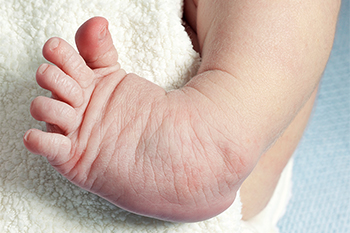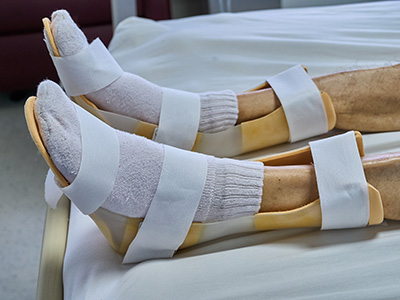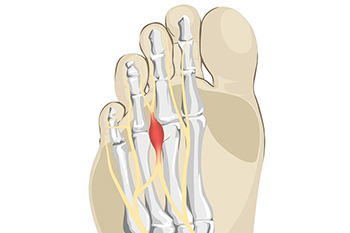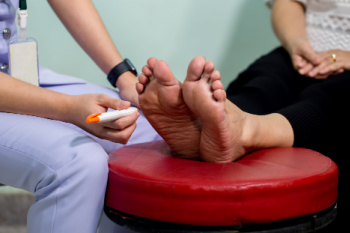Items filtered by date: November 2024
Definition and Causes of Idiopathic Congenital Clubfoot:

Idiopathic congenital clubfoot is a birth defect in which a baby is born with one or both feet twisted inward and downward. The term idiopathic means that the exact cause of the condition is unknown, although it is believed to result from a combination of genetic and environmental factors. The affected foot or feet may appear deformed, with the heel pointing downward and the toes turning inward, making it difficult for the child to stand or walk normally. Clubfoot can occur in isolation or as part of a broader condition, but in most cases, it does not affect other parts of the body. Early treatment is essential and usually involves methods, such as the Ponseti technique, which includes gentle manipulation and casting of the foot to gradually correct the deformity. In some cases, surgery may be required if other treatments do not work. If your child has been born with clubfoot, it is strongly suggested that a podiatrist is included on the healthcare team who can effectively monitor this condition.
Congenital foot problems require immediate attention to avoid future complications. If you have any concerns, contact Dr. Steven Sheridan of Ankle & Foot Specialty Clinics. Our doctor can provide the care you need to keep you pain-free and on your feet.
Congenital foot problems are deformities affecting the feet, toes, and/or ankles that children are born with. Some of these conditions have a genetic cause while others just happen. Some specific foot ailments that children may be born with include clubfeet, polydactyly/macrodactyly, and cleft foot. There are several other foot anomalies that can occur congenitally. What all of these conditions have in common is that a child may experience difficulty walking or performing everyday activities, as well as trouble finding footwear that fits their foot deformity. Some of these conditions are more serious than others. Consulting with a podiatrist as early as possible will help in properly diagnosing a child’s foot condition while getting the necessary treatment underway.
What are Causes of Congenital Foot Problem?
A congenital foot problem is one that happens to a child at birth. These conditions can be caused by a genetic predisposition, developmental or positional abnormalities during gestation, or with no known cause.
What are Symptoms of Congenital Foot Problems?
Symptoms vary by the congenital condition. Symptoms may consist of the following:
- Clubfoot, where tendons are shortened, bones are shaped differently, and the Achilles tendon is tight, causing the foot to point in and down. It is also possible for the soles of the feet to face each other.
- Polydactyly, which usually consists of a nubbin or small lump of tissue without a bone, a toe that is partially formed but has no joints, or an extra toe.
- Vertical talus, where the talus bone forms in the wrong position causing other bones in the foot to line up improperly, the front of the foot to point up, and the bottom of the foot to stiffen, with no arch, and to curve out.
- Tarsal coalition, when there is an abnormal connection of two or more bones in the foot leading to severe, rigid flatfoot.
- Cleft foot, where there are missing toes, a V-shaped cleft, and other anatomical differences.
- Macrodactyly, when the toes are abnormally large due to overgrowth of the underlying bone or soft tissue.
Treatment and Prevention
While there is nothing one can do to prevent congenital foot problems, raising awareness and receiving neonatal screenings are important. Early detection by taking your child to a podiatrist leads to the best outcome possible.
If you have any questions please feel free to contact our office located in Sandusky, MI . We offer the newest diagnostic tools and technology to treat your foot and ankle needs.
Managing Plantar Fasciitis with Dorsal Night Splints and Orthotics

Plantar fasciitis can cause significant discomfort, and using orthotics and dorsal night splints offers effective relief. Orthotics provide customized support to the arch of the foot, helping to distribute pressure evenly and reduce strain on the plantar fascia. They can alleviate pain during daily activities and improve overall foot alignment. Dorsal night splints are designed to keep the foot in a gentle, extended position while sleeping, which helps to stretch the plantar fascia and Achilles tendon. This continuous gentle stretch can significantly reduce morning pain and stiffness. These interventions work together to promote healing, enhance comfort, and reduce persistent foot pain. Incorporating orthotics and dorsal night splints into a treatment plan can lead to improved mobility and a better quality of life for those affected by plantar fasciitis. If you are suffering from plantar fasciitis, it is strongly suggested that you consult a podiatrist who can determine if this type of orthotic is right for you.
If you are having discomfort in your feet and would like to try orthotics, contact Dr. Steven Sheridan from Ankle & Foot Specialty Clinics. Our doctor can provide the care you need to keep you pain-free and on your feet.
What Are Orthotics?
Orthotics are inserts you can place into your shoes to help with a variety of foot problems such as flat feet or foot pain. Orthotics provide relief and comfort for minor foot and heel pain but can’t correct serious biomechanical problems in your feet.
Over-the-Counter Inserts
Orthotics come in a wide variety of over-the-counter inserts that are used to treat foot pain, heel pain, and minor problems. For example, arch supports can be inserted into your shoes to help correct overarched or flat feet, while gel insoles are often used because they provide comfort and relief from foot and heel pain by alleviating pressure.
Prescription Orthotics
If over-the-counter inserts don’t work for you or if you have a more severe foot concern, it is possible to have your podiatrist prescribe custom orthotics. These high-quality inserts are designed to treat problems such as abnormal motion, plantar fasciitis, and severe forms of heel pain. They can even be used to help patients suffering from diabetes by treating foot ulcers and painful calluses and are usually molded to your feet individually, which allows them to provide full support and comfort.
If you are experiencing minor to severe foot or heel pain, it’s recommended to speak with your podiatrist about the possibilities of using orthotics. A podiatrist can determine which type of orthotic is right for you and allow you to take the first steps towards being pain-free.
If you have any questions please contact our office located in Sandusky, MI . We offer the newest diagnostic and treatment technologies for all your foot and ankle needs.
Facts About Morton’s Neuroma

Morton's neuroma is a painful condition that occurs when a nerve in the foot becomes compressed or irritated, typically between the third and fourth toes. This condition often results in a sharp, burning pain in the ball of the foot, which may radiate into the toes. Patients commonly describe a sensation of having a pebble in their shoe, along with tingling or numbness in the affected toes. Diagnosing Morton's neuroma involves a thorough physical examination by a podiatrist, who may assess foot structure and check for tenderness in the affected area. Imaging tests, such as ultrasound or MRI scans, may be used to confirm the diagnosis and rule out other conditions. If you are experiencing symptoms of Morton’s neuroma, it is suggested that you consult a podiatrist who can accurately diagnose and treat this condition.
Morton’s neuroma is a very uncomfortable condition to live with. If you think you have Morton’s neuroma, contact Dr. Steven Sheridan of Ankle & Foot Specialty Clinics. Our doctor will attend to all of your foot care needs and answer any of your related questions.
Morton’s Neuroma
Morton's neuroma is a painful foot condition that commonly affects the areas between the second and third or third and fourth toe, although other areas of the foot are also susceptible. Morton’s neuroma is caused by an inflamed nerve in the foot that is being squeezed and aggravated by surrounding bones.
What Increases the Chances of Having Morton’s Neuroma?
- Ill-fitting high heels or shoes that add pressure to the toe or foot
- Jogging, running or any sport that involves constant impact to the foot
- Flat feet, bunions, and any other foot deformities
Morton’s neuroma is a very treatable condition. Orthotics and shoe inserts can often be used to alleviate the pain on the forefront of the feet. In more severe cases, corticosteroids can also be prescribed. In order to figure out the best treatment for your neuroma, it’s recommended to seek the care of a podiatrist who can diagnose your condition and provide different treatment options.
If you have any questions, please feel free to contact our office located in Sandusky, MI . We offer the newest diagnostic and treatment technologies for all your foot care needs.
How Peripheral Neuropathy Affects the Feet

Peripheral neuropathy affects the feet by damaging the nerves that carry signals to the lower extremities. Such nerve damage can result in numbness, tingling, burning sensations, and pain, which often begins in the toes. As peripheral neuropathy progresses, people may experience a loss of sensation in their lower extremities. This makes it difficult to detect injuries or temperature changes and can increase the risk of foot sores or ulcers. Muscle weakness or balance issues may develop, leading to instability or difficulty walking. A podiatrist can provide a thorough evaluation, which may include nerve conduction studies, electromyography, or a physical exam. In this way, a treatment plan to manage peripheral neuropathy symptoms, prevent further complications, and improve foot health, can be developed. If you experience foot problems related to neuropathy, it is suggested that you schedule an appointment with a podiatrist.
Neuropathy
Neuropathy can be a potentially serious condition, especially if it is left undiagnosed. If you have any concerns that you may be experiencing nerve loss in your feet, consult with Dr. Steven Sheridan from Ankle & Foot Specialty Clinics. Our doctor will assess your condition and provide you with quality foot and ankle treatment for neuropathy.
What Is Neuropathy?
Neuropathy is a condition that leads to damage to the nerves in the body. Peripheral neuropathy, or neuropathy that affects your peripheral nervous system, usually occurs in the feet. Neuropathy can be triggered by a number of different causes. Such causes include diabetes, infections, cancers, disorders, and toxic substances.
Symptoms of Neuropathy Include:
- Numbness
- Sensation loss
- Prickling and tingling sensations
- Throbbing, freezing, burning pains
- Muscle weakness
Those with diabetes are at serious risk due to being unable to feel an ulcer on their feet. Diabetics usually also suffer from poor blood circulation. This can lead to the wound not healing, infections occurring, and the limb may have to be amputated.
Treatment
To treat neuropathy in the foot, podiatrists will first diagnose the cause of the neuropathy. Figuring out the underlying cause of the neuropathy will allow the podiatrist to prescribe the best treatment, whether it be caused by diabetes, toxic substance exposure, infection, etc. If the nerve has not died, then it’s possible that sensation may be able to return to the foot.
Pain medication may be issued for pain. Electrical nerve stimulation can be used to stimulate nerves. If the neuropathy is caused from pressure on the nerves, then surgery may be necessary.
If you have any questions, please feel free to contact our office located in Sandusky, MI . We offer the newest diagnostic and treatment technologies for all your foot care needs.

